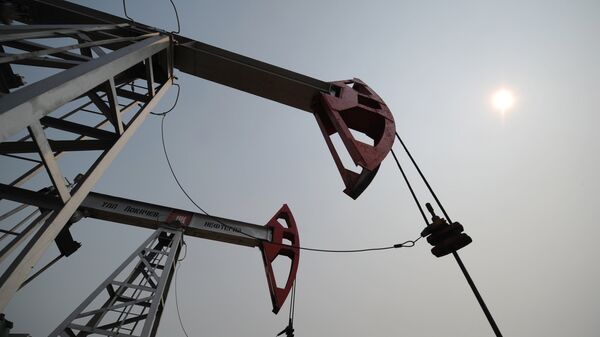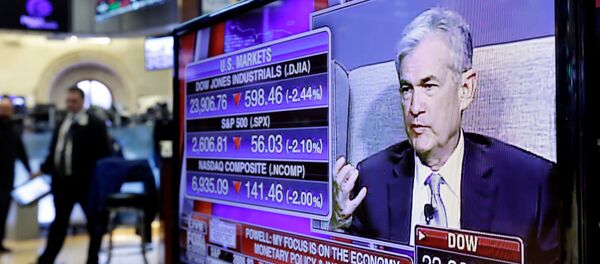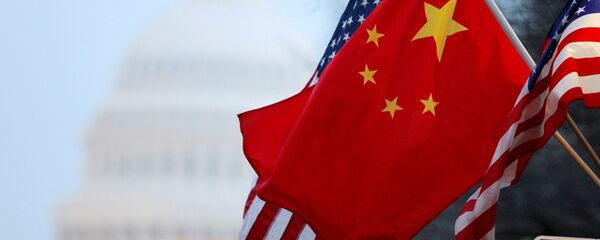Sputnik has discussed the state of US economy with Marc Ostwald, a Global Strategist at ADM Investor Services.
Sputnik: What's your take on the new competitiveness rating for the US economy? And to what extent do you this rating which is quite high for the US compared to previous years has changed due to the fact that they have also changed their methodology?
Marc Ostwald: I think to a certain extent the change in methodology is responsible, but I think it also reflects the cumulative benefits of the boom in the oil industry. I think people think of it as well, that gives them cheaper oil, which has definitely helped because most businesses have somewhere along the line some form of energy component which is a key costing component.
Businesses which had previously been considered uncompetitive but because they can access cheap energy they've been innovating a lot and per se disrupting; and so this all feeds in the long run, but it's a very long run process one has to say.
This isn't something that necessarily happens from one year to the next. The whole industry needs to evolve and then people need to see how they can take advantage of it and that's what's actually happened in the US and so one has to give credit.
READ MORE: Turkey Agrees to Free US Pastor in Exchange for Economic Benefits — Reports
Sputnik: To what extent do these ratings normally coincide with a country's performance for the year?
Marc Ostwald: If one looks at the US economy, it is traveling at a very healthy speed. I wouldn't say it has necessarily anything to do with Donald Trump. It is more a cumulative impact of things like they were one of the first countries to ensure after the global financial crisis that the banking sector reconciled its balance sheets, which is exactly what the euros and banks didn't do and which is why they're still struggling.
So it's definitely partly reflective of the strength of the US economy at the moment, as you see it in any measure you care to think of; GDP, very low unemployment. What's going on with wages I think is a different issue, it is far more complicated.
READ MORE: EU Blocking Statute, SPV Can Derail US Sanctions on Iran — Economist
Sputnik: How likely is the trade spat between the US and China and overall Trump's protectionist and very aggressive policies; how are they likely to affect the competitiveness of the US and also of China in the future?
Marc Ostwald: I think it really depends. There's a couple of aspects to this. First of all, it's not particularly just between the US and China. I think the other ones were the EU with other Asian countries, notably Japan, are really more to do with the specifics of bilateral trade.
With China, this is about the leadership of the global economy and this is what is called a Thucydides Trap, where you get a new economy emerging, or a new economic power emerging and it threatens to displace the other one. So it goes way beyond just things which have to do with trade.
You've seen it already. Food feed trade volumes down almost 15% in July and August, okay, they were slightly bloated in May and June thanks to people trying to beat the tariffs imposition, but that's where it hurts and this is where it's also going to hurt Donald Trump; because if you actually have a look at the agricultural areas where it's hurting most, it is precisely in his strongholds politically.
READ MORE: China Faces 'Alarming' Local Government Debt Amid Mounting Trade War With US
Sputnik: US officials have actually talked about their intentions to negotiate separate trade deals with the EU, the UK and Japan. Japan is actually also quite high on that list of competitiveness ratings. How difficult would it be to negotiate trade deals with all those countries separately and what kind of difficulties do you see in doing that?
Marc Ostwald: Well, the first difficulty is going to get everyone to agree to this currency clause; non-manipulation of currency clauses, which isn't exactly new. We've had this in now for about three years at every G20 meeting, that all the G20 countries agree that they won't manipulate their currencies. They still go on, Sweden probably being the worst manipulator of its currency. For the bigger blocs, the question is who is the arbiter of who is manipulating their currency? Is it just the US Treasury's controller of currency or is it much more bilateral?
With the UK, it really depends on what is negotiated with the EU, above all, in terms of adherence to EU rules; what one would call non-tariff measures, so regulatory measures; and I think in a lot of cases it is about the regulation.
Views and opinions expressed in the article are those of Marc Ostwald and do not necessarily reflect those of Sputnik.






